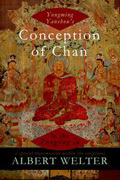
Yongming yanshou's conception of chan in the zongjing lu: a special transmission within the scriptures
Welter, Albert
Yongming Yanshou ranks among the great figures of the Chinese and East AsianBuddhist tradition. His main work, the one-hundred fascicle Zongjing lu (Records of the Source-Mirror), is regularly cited but has been subjected to littlesystematic investigation. Through a vivid reconstruction of the environment in which Yanshou lived and wrote, Welter aims to prove that Yanshou's conception of Chan was a vital contribution to the determination of Chan's future direction. Welter alsodraws evidence from the Zongjing lu's record of Chan master's teaching fragments, an important but frequently overlooked early source. This book provides thorough documentation and analysis of the Chan master's teaching fragments in the Zongjing lu. Yongming Yanshou ranks among the great thinkers of the Chinese and East Asian Buddhist traditions, one whose legacy has endured for more than a thousand years. Albert Welter offers new insight into the significance ofYanshou and his major work, the Zongjing lu, by showing their critical role in the contested Buddhist and intellectual territories of the Five Dynasties and early Song dynasty China.Welter gives a comprehensive study of Yanshou's life, showing how Yanshou's Buddhist identity has been and continues to be disputed. He also provides an in-depth examination of the Zongjing lu, connecting it to Chan debates ongoing at the time of its writing. This analysis includes a discussion of the seminal meaning of the term zong as the implicit truth of Chan and Buddhist teaching, and a defining notion of Chan identity. Particularly significant is an analysis of the longunderappreciated significance of the Chan fragments in the Zongjing lu, whichconstitute some of the earliest information about the teachings of Chan's early masters.In light of Yanshou's advocacy of a morally based Chan Buddhist practice, Welter also challenges the way Buddhism, particularly Chan, has frequently been criticized in Neo-Confucianism as amoral and unprincipled. Yongming Yanshou's Conception of Chan in the Zongjing lu concludes with an annotated translation of fascicle one of the Zongjing lu, the first translation of the work into a Western language. IntroductionChapter One - Yongming Yanshou and the complexities of Chan identityChapter Two - Revealing the Implicit Truth: Yongming Yanshou's Notion of Zongin the Zongjing luChapter Three - Establishing the Chan Zong: Yanshou's Notion of Chan in the Zongjing luChapter Four - Yanshou and Chan Lineages: An Overview of Chan Sources and Chan Patriarchs in the Zongjing luChapter Five - The Teachings of the Patriarchs: A Study of Chan Lineage Fragments in the Zongjing luChapter Six - The Buddhist School of Principle and the Early Song Intellectual TerrainTranslation of the Zongjing lu, Fascicle OneAbbreviationsNotesBibliography
- ISBN: 978-0-19-976031-2
- Editorial: Oxford University
- Encuadernacion: Cartoné
- Páginas: 400
- Fecha Publicación: 29/09/2011
- Nº Volúmenes: 1
- Idioma: Inglés
